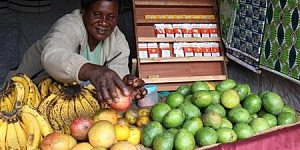 The Executive Board of the International Monetary Fund (IMF) has completed the second review of Burundi’s performance under the program supported by the Extended Credit Facility (ECF). The Executive Board’s decision will allow for the disbursement of an amount equivalent to SDR 5 million (about US$7.6 million), bringing disbursements under the arrangement to an amount equivalent to SDR 10 million (about US$15.3 million). The Executive Board’s decision was taken on a lapse of time basis. Burundi’s three-year ECF arrangement was approved on January 27, 2012.
The Executive Board of the International Monetary Fund (IMF) has completed the second review of Burundi’s performance under the program supported by the Extended Credit Facility (ECF). The Executive Board’s decision will allow for the disbursement of an amount equivalent to SDR 5 million (about US$7.6 million), bringing disbursements under the arrangement to an amount equivalent to SDR 10 million (about US$15.3 million). The Executive Board’s decision was taken on a lapse of time basis. Burundi’s three-year ECF arrangement was approved on January 27, 2012.
Real gross domestic product growth is estimated to have decelerated to 4 percent in 2012, in the face of a sharp deterioration in the terms of trade by a cumulative 27 percent during 2011–12. Inflation peaked at 25.3 percent (year-on-year) in March 2012 before declining sharply to 11.8 percent at end-2012, owing in part to tight monetary policy and the temporary removal of taxes on food products. Lower liquidity within the banking system contributed to a slowdown in growth in credit to the private sector.
The fiscal deficit was lower than programmed owing to tighter financing conditions. Despite the adoption of corrective measures in mid-2012, revenues were lower than expected due mainly to the foregoing of fuel-related excise taxes for most of 2012 and the effects of the economic slowdown. Spending on priority areas was slightly lower than expected owing to delays in implementing new revenue measures and disbursements by some donors.
Progress under the program has been satisfactory under difficult circumstances. All targets and structural reforms under the program through end-September were met except the indicative target on pro-poor spending, which was missed by a small margin. For the remainder of the program, the policy agenda focuses on increasing revenue mobilization, strengthening public financial and debt management, and strengthening the central bank’s oversight of the financial system.
Key risks to the outlook arise mainly from the deterioration of terms of trade, slower than expected global growth, any decline in external assistance, and regional insecurity. However, absent these risks materializing, growth of economic activities is expected to rebound and inflation would continue to ease owing to lower international food and fuel prices.
Source: IMF



































